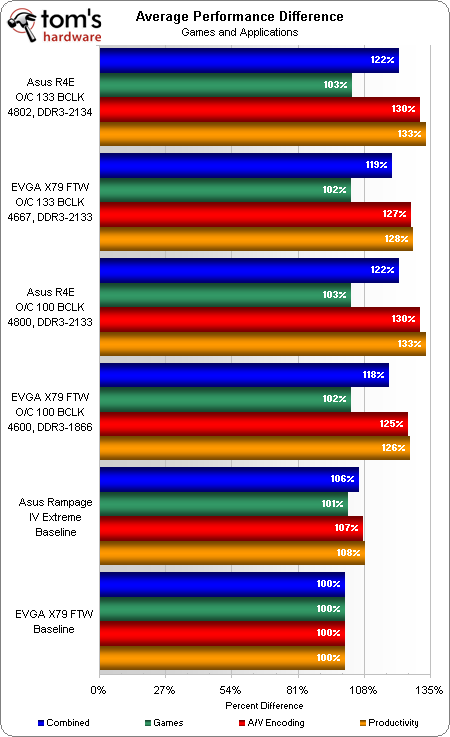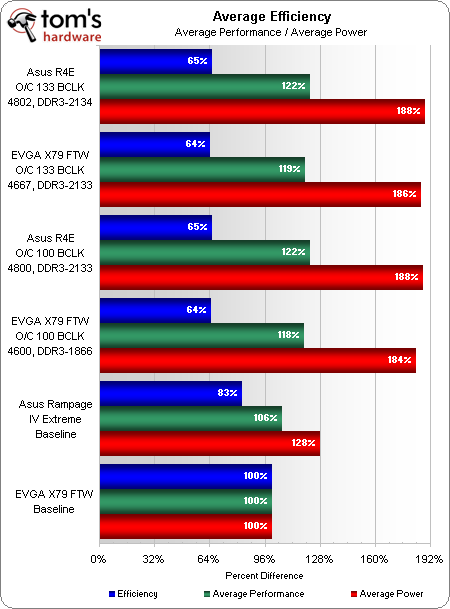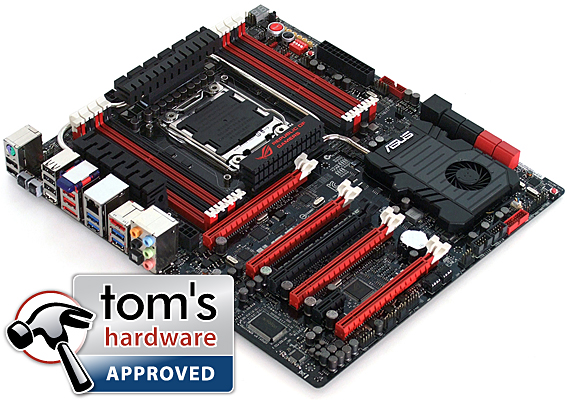Overclocking: Asus Rampage IV Extreme Versus EVGA X79 FTW
Many companies claim to offer the best overclocking for your money, yet only two compete for the best overclocking at the very highest price point. Today we put those claims to the test, including a full set of benchmarks to analyze performance gains.
Asus Versus EVGA: Who Wins?
Today’s comparison leaves little doubt that Asus provides the most comprehensive set of out-of-the-box overclocking features. Its Rampage IV Extreme also has the most complicated firmware. And yet, users who don’t want to change a hundred settings can still achieve a very respectable overclock. Although the easiest overclocking method (using built-in-profiles) didn’t appear optimized for our specific CPU, manually configuring the system to XMP-2133, a 48x CPU multiplier, and a 1.45 V core setting was simple.
EVGA has the greenest default power settings, so we're using them as today's performance and power baseline. The true goal of today’s test was to seek overclocked performance, where low-power settings aren’t used
Asus’ baseline performance lead comes at a huge cost in power consumption, while its overclocked performance lead is relatively small compared to EVGA. For the best balance of performance and power savings at standard settings, EVGA has the upper hand.
But most overclockers disable power-saving settings anyway in order to achieve the highest stable performance. Once you do that, EVGA’s power consumption increases up to Asus levels. The result is an extremely small efficiency loss, due to its slightly-inferior overclock at similar voltage settings.
Asus might have won this round, but its Rampage IV Extreme costs around $50 more than its similarly-capable and more productivity-oriented four-way SLI motherboard, the P9X79 WS. While we’re hesitant to pay the extra money for this platform's exact feature set, we know many users who would. And so, we give the Rampage IV Extreme our entry-level recommendation, the Tom's Hardware Approved award, for its ability to service overclocking exhibitionists.
A Case of Mistaken Identity?
Our examination of the X79 FTW’s DDR3 configuration issue, originally brought to our attention by a reader, demonstrates that this is primarily a timing issue. We were able to use our RAM at DDR3-1866 by simply changing its primary timings manually. And while we never were able to use its 21.33x multiplier to reach DDR3-2133 at stock base clock, we were able to hit our target data rate by combining the board's 16x memory multiplier with a 133.3 MHz base clock and manual secondary timings. We further relied on our screenshots from the firmware of EVGA’s competitor to provide those secondary timings.
Get Tom's Hardware's best news and in-depth reviews, straight to your inbox.
An extensive web search indicated that the same configuration problem equally affects both the X79 FTW and X79 Classified. Sharing of certain firmware modules is the most likely explanation, and we could confirm that if we had both boards. On the other hand, firmware issues are something we would not expect at this price point on a product so specifically aimed at overclocking enthusiasts. We expect the issue to be resolved in future products, but must rely on our community to track changes in the firmware of current products as we again try to move on to the “next big thing”.
Current page: Asus Versus EVGA: Who Wins?
Prev Page Benchmark Results: Productivity-
EzioAs Nice article.Reply
Where is the MSI Big Bang Xpower II? That's known to be a great board for overclocking as well. -
schn1tt3r I'd love to see a comparison like this between the Rampage IV Extreme and the Rampage IV Formula. The price difference is over $100 and I don't see WHY. 8 RAM slots is something I would never fill up so the Formula and its 4 slots seems perfect to me.Reply -
hellfire24 i would take rampage iv formula.it's cheaper and provides similar features.who needs 4-way sli?Reply -
Crashman WR2Kind of a lukewarm recommendation. Just 'Tom's Hardware Approved award'Only because there aren't many readers who can get $50 of value out of its specific feature set, compared to the WS.Reply -
halcyon I wish I hadn't seen this. I really do. I have no excuse to get an X79 based system. I don't. I..do...not. I want. ...but I can't. Food. Food is important.Reply -
master9716 You guys really need to start Testing @ 5760x1080 !!! , Monitors go for really cheap on craiglist now from wholesellers , you can buy 3 24" leds for like 300 bucks so a lot of people that I know have been runing 3 monitor setups for a while.Reply -
jaquith Thanks Thomas for another enlightening Article! :)Reply
Just knowing the ASUS and EVGA from past history (LGA 1366) which may or may not play any role here, ASUS tends to (lets call it adjust) the CPU vCore and VTT/VCCSA higher than advertised vs EVGA which probably explains* the problems with both the high frequency RAM and CPU OC's.
The disturbing thing to 'me' was the regulator voltages. I know the EVGA uses 12+2 vs ASUS's 8+3+(2+2) PWM and it's all digital controlled on ASUS, (*)but IDK if the EVGA is digitally controlled which might explain the inefficiency and OC.
The EVGA has always been a very 'manual' MOBO, so in that regard I'm not surprised you had to dive into the BIOS. I have no doubts if you raised the EVGA's voltages vs a cloned ASUS optimized OC set that you'd have no problems obtaining the SAME 4.8GHz OC. Both boards offer voltage check points and I'd be very interesting how they compared.
Just the other day I updated my ASUS BIOS and right-off I noticed an increased vCore increase by +0.01v~+0.015v and as part of the documented (improvements) was 'Improved Stability' ; yeah sure if you raise the vCore or VTT/VCCSA, phase, etc profiles... Now I have to redo my validations.
The most important testing here, to me, is the Baseline Comparison which tells me EVGA has some work to do ASAP, and hopefully a BIOS update can close the gaps. Further, personally I won't buy or recommend any X79 MOBO unless it offers an 8xDIMM option. In the forum it's been very clear which X79's I recommend since day one, and the ASUS R4E has always been on top on my list if you can afford it! ;) -
spookyman Considering Ivy Bridge is around the corner. Would it be beneficial in buying a Sandy Bridge-E board?Reply



